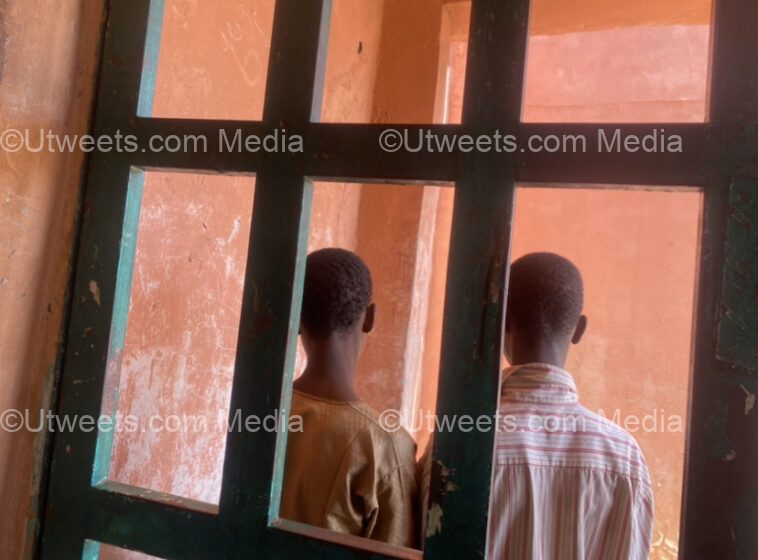V!EW BEFORE THEY GOT DELETED| Baltazar FROM Equatorial Guinea TRENDS AGAIN AS OVER 50 OF HIS FRESH BEDR00M V!DEOS SVRFACES ONLINE.Sixteen-year-old Salmanu Suleman recalled every detail: the cold bite of the handcuffs on his small wrists. The panic as he was led inside the desolate police cell with officers’ guns aimed at him. The hours of standing to allow a few others to take a quick nap. And the thought of not seeing his mother again. All the memories came to him like a wave crashing onto the shore. ...Tap To Read The Full Story Here | ..Tap To Read The Full Story Here...
He is from Kilgore of Yabo local government, some kilometres from Sokoto town.
It was August 1, the first day of the protest and he was in front of the Usmanu Danfodiyo University Teaching Hospital to get water and food for his ailing mother. He had just gotten to the hospital with his mother, who was rushed to the emergency centre due to a sickness that morning. Being the elder son of his mother and the only one available to tend to her needs, he went out of the hospital premises to get water and food for her.
He was stopped by the police, pushed into their van and was taken to the Sokoto State CID. That was when he heard last about his mother.
“Now, I don’t know whether my mother is alive or not or if she returned home,” he said.
Salman’s mother had come to Sokoto town for a wedding ceremony when she fell sick. Her father was not available, so she became a responsibility of her aunt and his. Upon getting to the hospital that morning, they were told she needed a drip. But he needed to get her something to eat too, so he went out.
“I was arrested on Thursday around the UDUTH main gate when I came to buy food for my mother,” he said. “As I was working beside the road, they just called and asked me to enter their car. I asked them what I have done. But they just corked their gun, and l quickly surrendered and entered the police car.”
Even when Salman, who graduated from Nagarta College Sokoto this year, explained that he only came out to get food for his mother, and was not part of the protest, they turned a deaf ear.
Although he spent a day at the state CID, he was still being held at the Sokoto remand home 58 days after his arrest. He had not heard from his father or other relatives.

“Since the time l was arrested and brought here, nobody had ever visited me. I have some relatives here in Sokoto, but I don’t know their contacts.”
Salman said he wanted to go back to his father’s house to continue his education and business, but he had no money to pay a fine of N130,000 to secure his freedom.
“I’m living with people here peacefully but life here is not easy at all. I needed to go back to my father’s home to continue my education and business because my father was a furniture maker, and he trained us in his business.”
This is not an isolated incident. Many children under 18 were picked up across states that participated in the EndBadGovernance protest from August 1-10, especially in Sokoto and Kano States. Some of these children were not part of the protesters but were caught in the crossfire.
In Kano, at least 40 minors were arrested, while in Sokoto at least 16 were arrested and arraigned during the protests. In Sokoto, those who pleaded guilty under a mobile court set up at the State CID without legal representation, which had been dubbed illegal, paid fines exceeding N100,000 for offences bordering on criminal conspiracy, disturbance of public peace, and mischief.

Even though the Nigerian Constitution and Child Rights Act clearly stipulate that children under the age of 18 should not be treated as adults in the justice system, these minors faced severe violations of their rights. According to the Act, no child should be subjected to inhumane or degrading treatment, nor be unlawfully detained or kept incommunicado by security operatives.
Section 204 of the Child Rights Act states, “No child shall be subjected to the criminal justice process or to criminal sanctions, but a child alleged to have committed an act which would constitute a criminal offence if he were an adult shall be subjected only to the child justice system and processes set out in this Act.”
The police’s actions, including detaining minors like Salman, with adults without legal representation or access to family, show a blatant disregard for both national laws protecting children’s rights, according to Ridwan Oke, a human rights lawyer, and founder of Iris Attorneys LP.V!EW BEFORE THEY GOT DELETED| Baltazar FROM Equatorial Guinea TRENDS AGAIN AS OVER 50 OF HIS FRESH BEDR00M V!DEOS SVRFACES ONLINE.
Also, Section 205 of the Act provides for the protection of the privacy of a child at all stages of the child justice administration and that the interest of the child must be paramount in all proceedings. Oke stressed that parading them in front of cameras, granting unnecessary access, and failure to protect their images is a blatant disrespect of the law. He said any information that may lead to the identification of a child offender is not expected to be published.
Arrested on his way to Islamic school
Yasir Nura’s case is no different. Knelt on a hard floor, alongside Salman in the remand home, Nura’s eyes, a boy from Rimin Tawaye in Sokoto, were filled with tears. His cheeks hollow, and his skin stretched tightly over his face, making his eyes look larger like they’re pleading for something they can’t quite put into words. His clothes hang loosely on his body, faded and worn. He had been on that cloth since he was picked up 58 days earlier.
Nura is 15, but life has not been easy for him. He lost both his parents and now lives with his mother’s relatives, who, he said have become his only family. Even though Nura explains that they do what they could to provide for him, he sells milk to augment the support and assist the family before going to Islamiyah.
But that fateful Thursday was different. Nura was arrested by the police, with a uniform on his neck, as he was heading to his Islamiyah class.
“I was arrested with my uniform on my way to Islamiyah School,” he said, adding, “They took me to the CID and later on to this place (prison) on the second day.”
Nura insisted he was never part of the EndBadGovernance protests. “I wasn’t amongst the protesters; it was after the protest that I came out, just on my way to Islamiyah school, and they arrested me,” he said, even as he, alongside, Salman still hoped that they will regain freedom soon enough.
“My relatives are the ones taking care of me, and they don’t have the means to pay the N130,000 we were asked to pay for bail,” he said.
Not backing down
Recently, the Inspector-General of Police, Kayode Egbetokun, authorised the arraignment of 76 detained #EndBadGovernance protesters at the Federal High Court in Abuja. Among them, were 27 minors, who had spent over 90 days in custody.

Charged with offenses under case FHC/ABJ/CS/503/2024, these children now face a 10-count charge that includes treason and conspiracy to destabilise Nigeria between July 31 and August 4, in violation of Section 96 of the Penal Code and punishable under Section 97.
The court proceedings on November 1 took a dramatic turn when a 15-year-old defendant and a few others collapsed in the judge’s presence. The boys, alongside others, appeared visibly malnourished and showed clear signs of suffering and fatigue.V!EW BEFORE THEY GOT DELETED| Baltazar FROM Equatorial Guinea TRENDS AGAIN AS OVER 50 OF HIS FRESH BEDR00M V!DEOS SVRFACES ONLINE.
This case was aside a number of other minors arrested in other parts of the country, particularly, those who although had been granted bail but had not met the conditions and remained in prisons, over three months after their arrest. This may too be the case of the over 20 minors arraigned in Abuja, as the court imposed against them, what has been described as an outrageous bail condition.
The court granted bail in the sum of N10 million each to the minor protesters who were arraigned and are however required to provide one surety, who must be a civil servant.
Although the incident has continued to intensify public scrutiny and raised questions about the conditions under which these minors have been held for three months, the Nigerian police claimed that the suspects who collapsed in court before their arraignment did so intentionally, as part of a planned effort to draw negative publicity.
“Today, an unexpected incident in court saw six of the suspects suddenly rushed out and fainted, drawing media attention in a deliberate manner to attract negative attention.
“Medical aid was promptly provided to these individuals, demonstrating the Police Force’s commitment to the welfare of those in its custody, irrespective of the allegations they face.” the IGP said.
Deji Adeyanju, the counsel to the defendants, in a report by FIJ, argues that these arrests violate Nigeria’s laws on minors and their protection under the Child Rights Act.
“Only magistrates should be granting remand warrants,” Adeyanju said, questioning the legality of the extended detention without proper legal justification.
He pointed out that, under Nigerian law, remand warrants for minors should be granted only under stringent circumstances and should not exceed 14 days. However, many of the detained minors had been held for over 28 days, far exceeding these legal limits. “A remand warrant should not last longer than 14 days in the first instance, and it can be granted for a further 14 days if the first one expires,” he said.
However, with the incident heightened when some minors, who were among 76 persons arraigned by the Nigerian Police Force (NPF), collapsed in the court on Friday, October 1, president Bola Tinubu ordered the release of the minors on November 4.
What it feels like losing family members
For many victims tracked by The ICIR to document their ordeals, the fear of reprisal is too strong to speak openly or even grant consent. It took an extra effort to convince some of them to share their plights as many described how they have been living in fear ever since.
Ayuba, whose son, Halifa, and nephew were arrested by the police, said the period of their absence felt like hell, but he could only thank God for bringing them back alive.V!EW BEFORE THEY GOT DELETED| Baltazar FROM Equatorial Guinea TRENDS AGAIN AS OVER 50 OF HIS FRESH BEDR00M V!DEOS SVRFACES ONLINE.

Halifa Ayuba, a 20-year-old alongside his two relatives – 17-year-old Bashir Hassan and 13-year-old Yusuf Yahaya – spent 43 days in detention after picking up what they described as ‘outdated foreign currency’ on the streets of Kano during the first day of a protest.
The trio had gone out for the protest at the government house, and walked through Zaria Road, and subsequently marched down to Galadanci on the day of protest. But on their way back, the young boys picked up some foreign currency sprayed by some individuals.

When the boys reached Gwale, a policeman stationed around the axis, called them and asked what they were doing with the money. When they explained that they picked the money up on the street, their boss ordered their arrest.
“They were taken to the Gwale police division, where the DPO asked his officer to put them behind the canter. After 30 minutes the DPO said they should be put in the cell. The next day they took them to the state CID where they spent three days. They were later remanded in prison where they spent 43 days,” Ayuba says.
Ayuba said the detectives arrested his wards despite clearly seeing that they were harmless children. He also lamented that his children would spend nearly 50 days in prison without respect to their fundamental rights.
Ayuba’s son, Halifa narrating his experience at the Kano state CID, said it was hell.
“We couldn’t sleep for three days, the cell was so jam-packed that you couldn’t even squat. We spent three days standing, no ventilation, and people were just fainting. No space to sleep at all.V!EW BEFORE THEY GOT DELETED| Baltazar FROM Equatorial Guinea TRENDS AGAIN AS OVER 50 OF HIS FRESH BEDR00M V!DEOS SVRFACES ONLINE.
“We all stuck to the wall and created a space that could contain five people, so those five people will sleep for 30 minutes then wake up and give another set of five people will sleep for thirty minutes.
“They didn’t feed us. There was one person who usually volunteered and bought food for us. Many people were suffering from ulcers in the cell, people were just fainting anyhow.”
His experience at the Goron Dutse prison was like ‘Paradise,’ compared to what he witnessed at the hands of the police. “It was like paradise because of care and feeding provided. We were given soap to wash our bodies and bath. So, we spent 43 days before we were released.”
More pathetic stories
The vice president, Nigerian Bar Association, and the chairman committee on Human Rights, Mansur Aliyu, told The ICIR that 91 individuals were arrested during the protests, among which 75 adults were remanded in the correctional centre.
While at the prison and remand home, Mansur Aliyu came into contact with Yahusa Muhammad and his colleagues. Muhammad from Dan Chadi village, a few kilometres away from Sokoto, who came from Oyo State with his friends, explained that they were all arrested, and their luggage nowhere to be found.
“When we were profiling them at the prison and remand home, our first question was about their names, followed by where they resided. One of them who identified himself as Yahusa explained that he had just arrived from Oyo State with his bag and everything, alongside his colleagues.
“After being dropped off by the car, they were immediately arrested and taken to the CID. Unfortunately, he found himself in prison without the ability to locate his luggage.
“While interviewing another person, he told me that he was arrested on his motorcycle while carrying some children to a particular place. Mobile police blocked and picked him up. He didn’t even know the whereabouts of his motorcycle up till that moment. Another fellow also told me that on Friday while he was carrying his prayer mat and heading to the mosque, he was arrested. He was simply pushed into the police vehicle and taken to the CID,” Aliyu narrates.
Amnesty condemns detention, says 24 citizens killed by police
Reacting to this, the Amnesty International condemned what it described as the ‘violent crackdown’ by Nigerian security forces of the #Endbadgovernance protest, which it said resulted in at least 24 deaths and the detention of over 1,200 protesters, including minors.
In its report “Bloody August: Nigerian Government’s Violent Crackdown on #Endbadgovernance Protests”, Amnesty says police used live ammunition against peaceful protesters, killing young people, children, and an elderly person in states like Kano, Kaduna, and Niger.
“People in Nigeria witnessed unbelievable lawlessness as security personnel fired live ammunition at peaceful protesters. The death toll could be higher than 24 because of the authorities’ desperate efforts to cover up the atrocities. Peaceful protests over government policies is now a matter of life and death in Nigeria.
“The Nigerian authorities must hold the police and other security agencies to account for unleashing deadly force on people who did not constitute an imminent threat to lives. It is shocking that police have engaged in flagrant denials of wrongdoing despite public evidence to the contrary. V!EW BEFORE THEY GOT DELETED| Baltazar FROM Equatorial Guinea TRENDS AGAIN AS OVER 50 OF HIS FRESH BEDR00M V!DEOS SVRFACES ONLINE.
This speaks to their utter disregard for the sanctity of human lives. President Bola Tinubu must constitute an independent and impartial investigation of human rights violations during the #Endbadgovernance protests,” said the director of Amnesty International Nigeria, Isa Sanusi...Tap To Read The Full Story Here.





